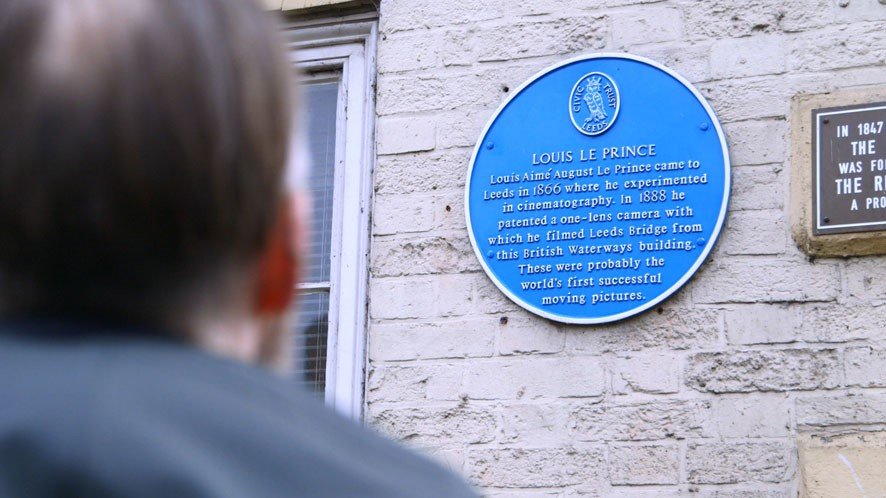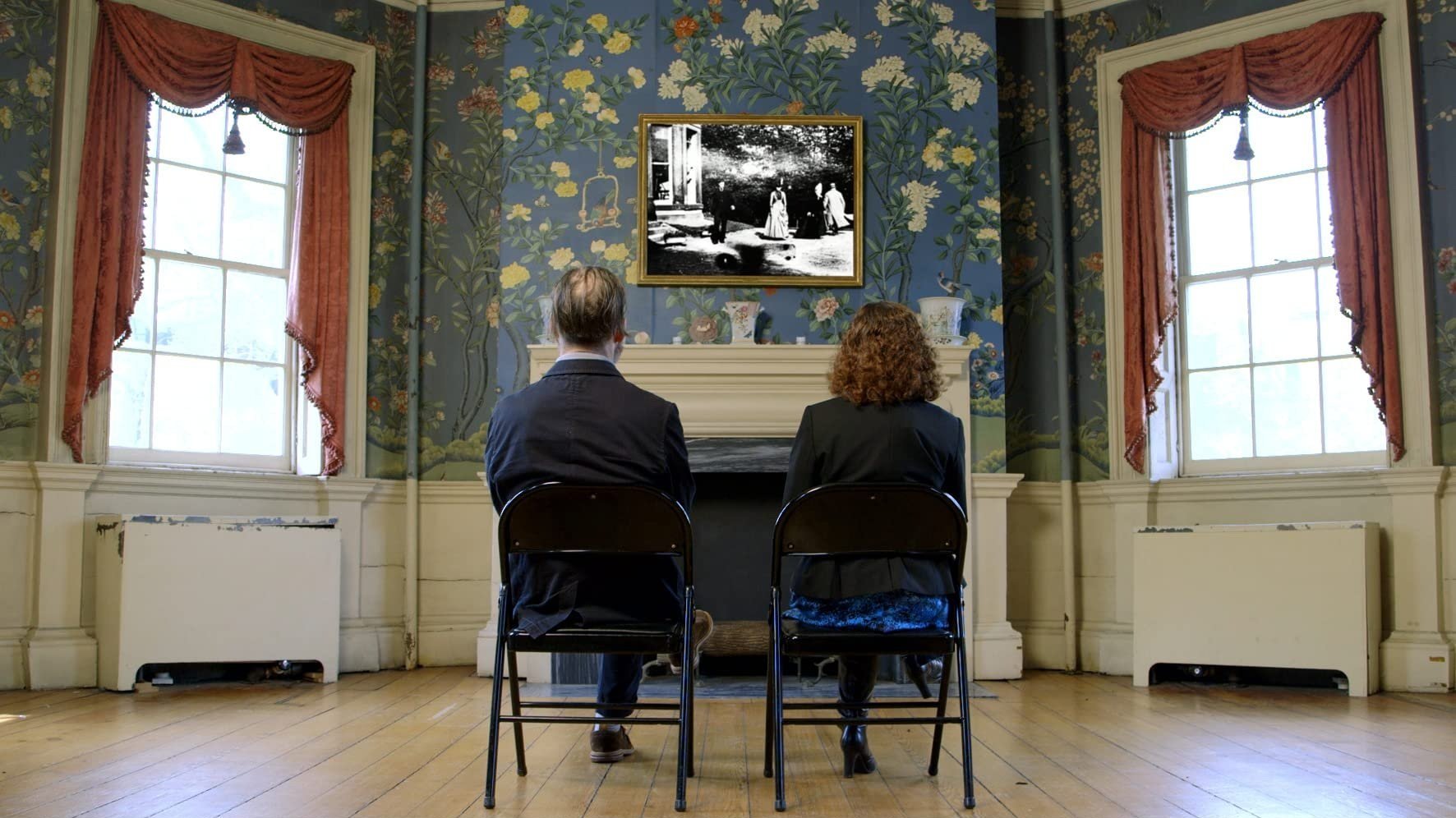
The First Film
★★★★ “An Absorbing history lesson”. - Daily Express
┃
★★★★ “Fascinating…The First Film should be a worthy resource for cinema history enthusiasts and students alike.” - CineVue
┃
★★★★ “Highly recommended for film buffs, students and fans alike.” - Flickering Myth
┃
★★★★ “An Absorbing history lesson”. - Daily Express ┃ ★★★★ “Fascinating…The First Film should be a worthy resource for cinema history enthusiasts and students alike.” - CineVue ┃ ★★★★ “Highly recommended for film buffs, students and fans alike.” - Flickering Myth ┃
The investigation begins….
“Louis Aimé August (sic) Le Prince came to Leeds in 1866 where he experimented in cinematography. In 1888 he patented a one-lens camera with which he filmed Leeds Bridge from this British Waterways building. These were probably the world’s first successful moving pictures”
So reads a blue heritage plaque on a building overlooking Leeds Bridge. This is the starting point for Wilkinson’s investigation, a quest to finally discover whether that word ‘probably’ can be removed.
ABOUT
There are three surviving film scenes, shot by Le Prince, in Leeds. Being able to definitively date and place these scenes is the key to Wilkinson’s case that Le Prince’s work preceded that of the Lumiere Brothers or Edison.
His detective partner is Irfan Shah, a Leeds-based researcher. Shah had discovered an original pamphlet written by E. Kilburn Scott after Le Prince’s death, which he shares with Wilkinson. Scott had worked with Le Prince and was outraged that Edison, in particular, was taking the credit and benefitting from the advances that Le Prince made. Sadly it was a privately produced pamphlet and not widely distributed at the time. Wilkinson must go on to find the corroborating evidence that will prove Le Prince’s legacy.
Louise Le Prince was born in Metz in 1841, so Wilkinson travels to France to meet up with Jacques Pfend, the world’s foremost authority on Louis Le Prince.
Le Prince received an extensive education, studying in Paris and at the Universities of Bonn and Leipzig. It was at Leipzig that Le Prince was introduced to John Whitley, who was to be influential in bringing Le Prince to Leeds.
John Whitley’s father had established an engineering firm in Leeds and was looking to expand into European markets, particularly France. John knew how useful Le Prince could be and invited him to Leeds in 1866.
There, Le Prince met and fell in love with John’s sister Lizzie. He married, started a family and established his career in the Yorkshire city, which was gaining a reputation for innovation.
Wilkinson goes on to investigate the links between Le Prince and various prominent local figures – artists, industrialists, inventors, etc. – to try and discover what sparked his interest in the moving image.
His search continues to reveal many clues to his life and career in Leeds and the development of Le Prince’s artistic ideas, which ultimately culminate in the technological breakthroughs that will bring moving pictures to the world.
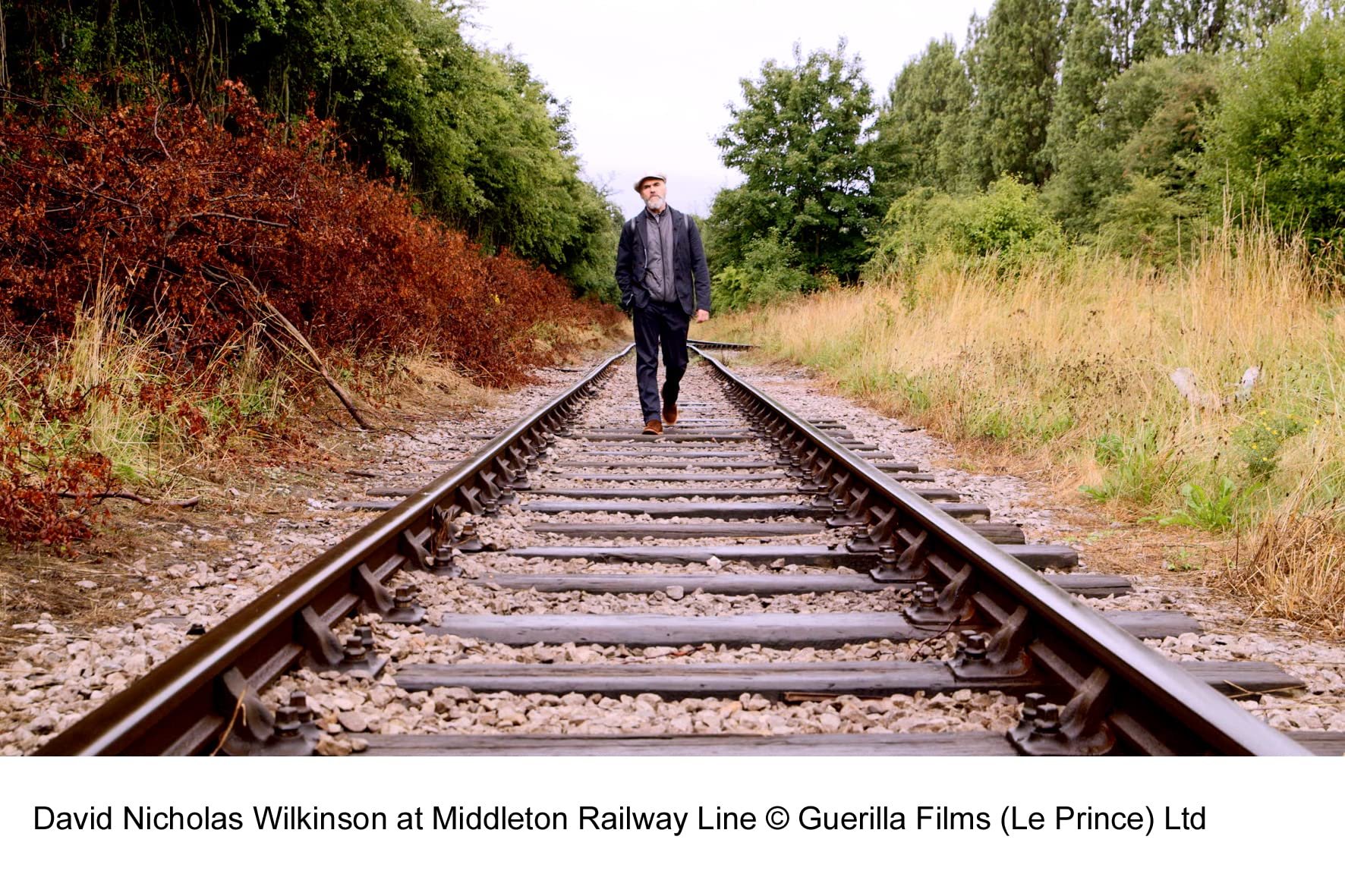
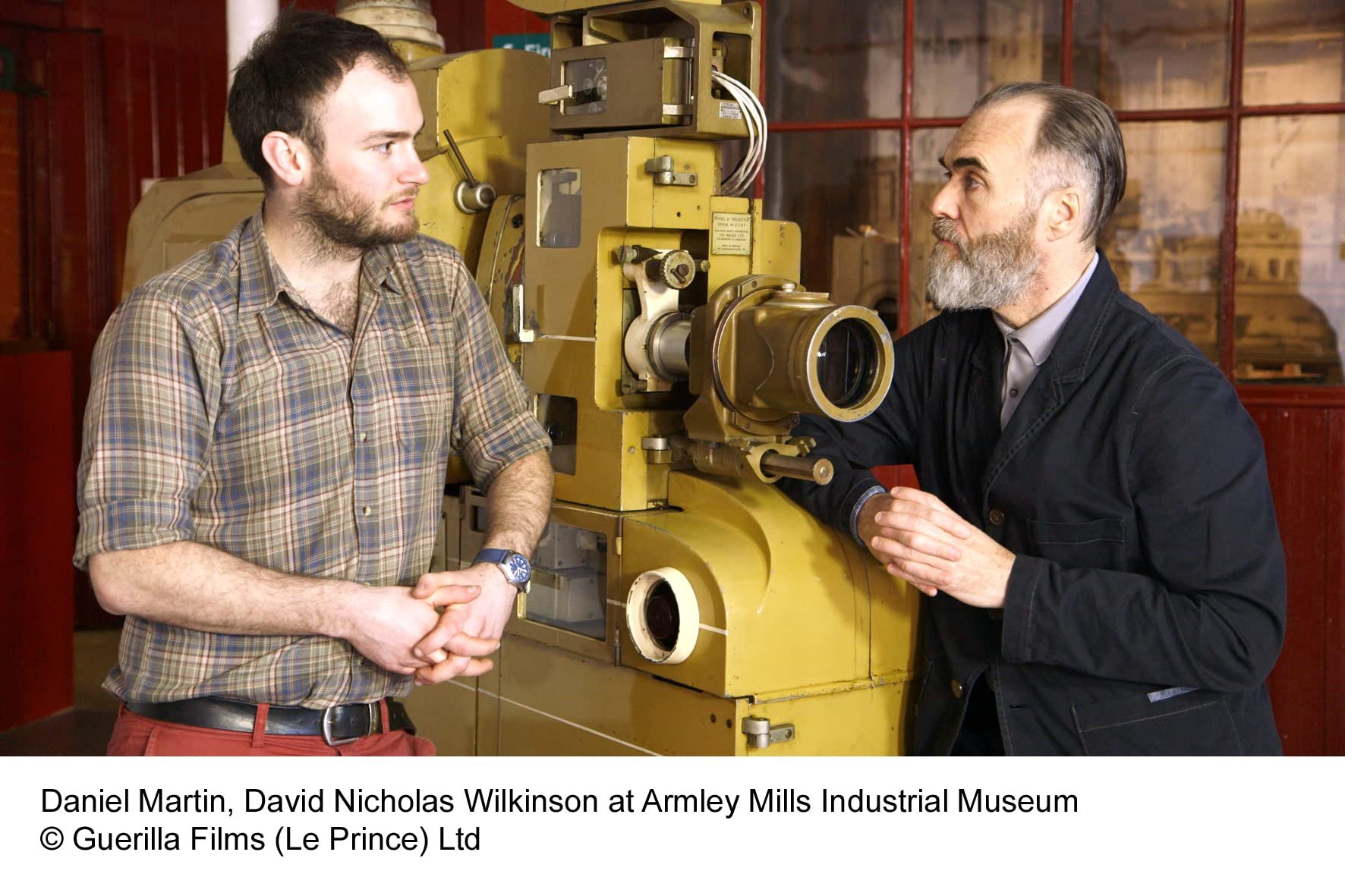
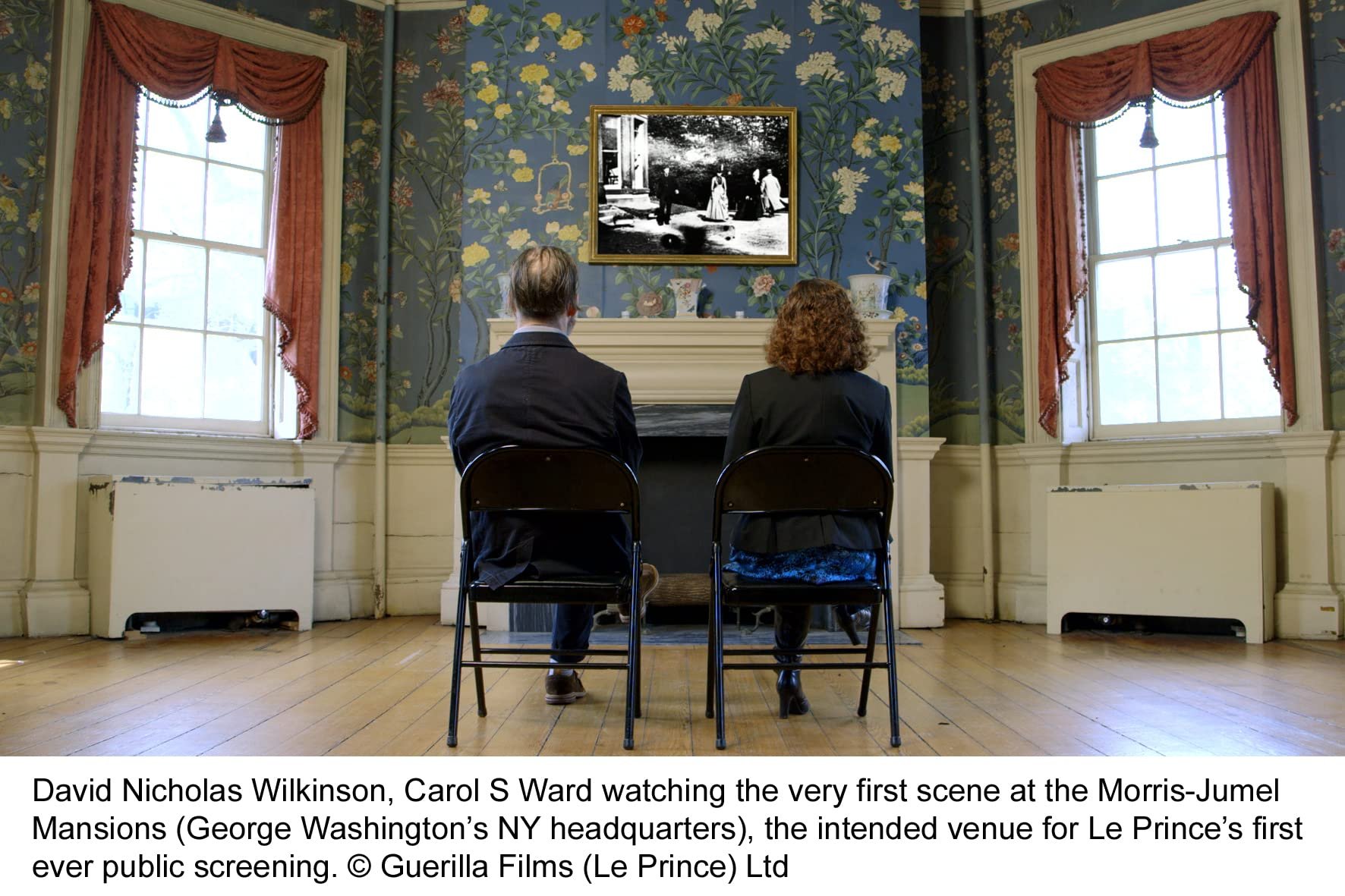
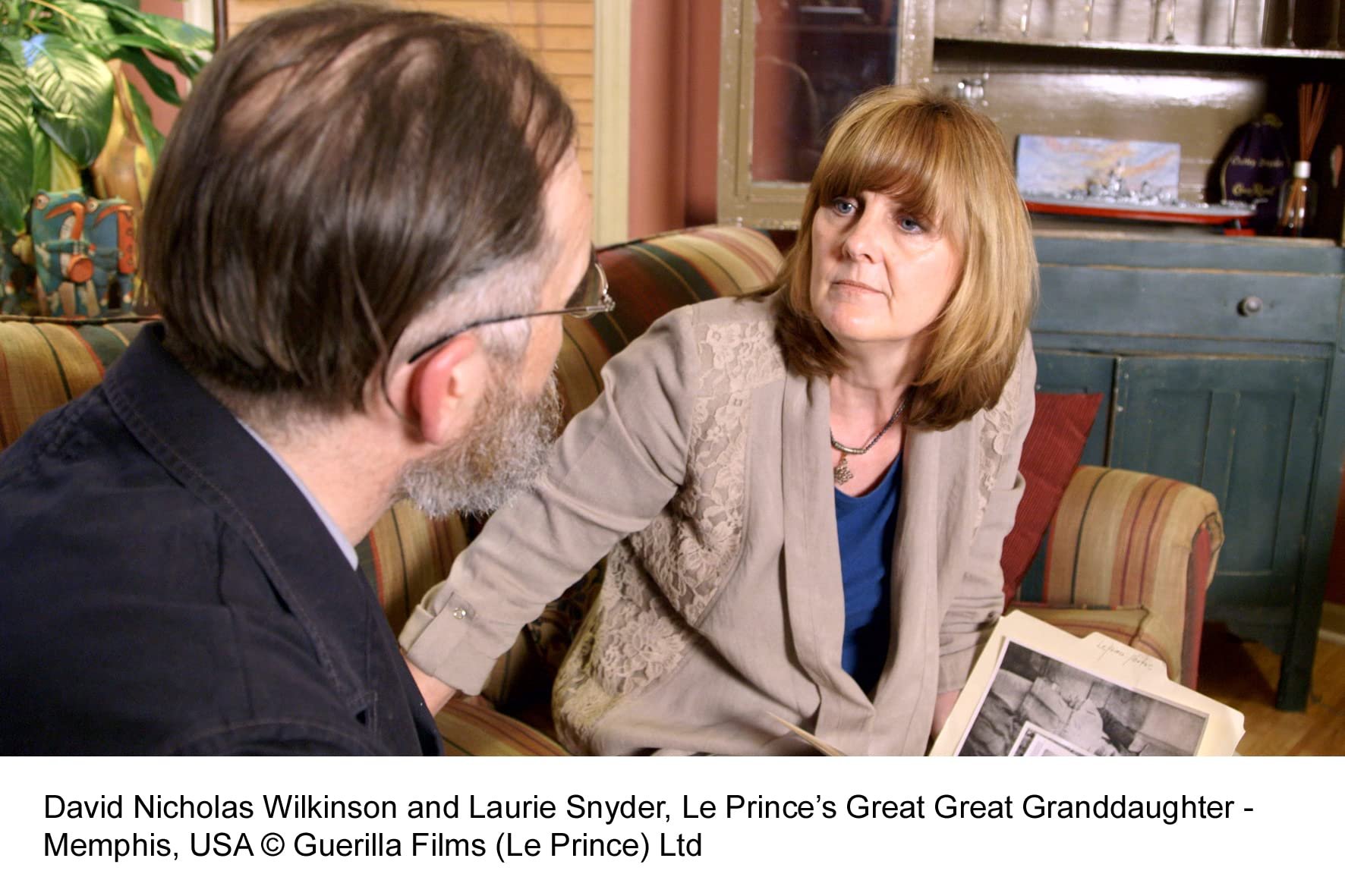
Background – The beginning
Over 45 years ago Wilkinson was a pupil at Benton Secondary Modern, Rawdon in Leeds and he remembers being told that film was invented in the city. At the time he, like many others, did not believe it. However, he would later change his mind when he came to know more about Louis Le Prince, a French man who came to Leeds in 1866 and started experimenting with cinematography. In October 1888 he recorded the very first moving images on a single lens camera in the city, seven years earlier than the Lumiere Brothers in Paris.
The people of Leeds have long regarded Le Prince as a local hero. There have been many local newspaper articles and the book ‘Made In Yorkshire’ which was written by local film expert Tony Earnshaw. However, despite this recognition of his pioneering work from his adopted home city his fame has not spread and he has not been formally acknowledged by any official body.
Wilkinson has witnessed the incredulity that this story is met with first hand. Convinced that the birthplace of the moving image was the city of his birth, Wilkinson has tried to convince the filmmaking world of this fact. On visits to Hollywood, New York, Paris and the Cannes Film Festival he has told the tale of Louis Le Prince and his Leeds invention but it has been met with disbelief. “Almost no one knew who he was. The typical response was ‘well if that was the case I would know about it’ “.
Wilkinson believed that this is was a story that must be told and he joined up with a team of film professionals who shared his vision to right what they perceived to be a great wrong – Co-producer Bill Lawrence (former Head of Film at the National Media Museum in Bradford and former board director of Screen Yorkshire, and now a board director of Creative England) and Leeds-based Researcher and Co-writer Irfan Shah.
Those helping to tell the story are Quentin Dowse a former senior policeman from East Yorkshire, film historians Stephen Herbert, Michael Harvey, Mark Rance, and Daniel Martin at Armley Mills Industrial Museum, with contributions from leading IP lawyer Louise A Handley, American historian Carol S Ward, CEO of Film London Adrian Wootton and Professor Tony North.
The result is THE FIRST FILM, filmmaker David Nicholas Wilkinson’s 33-year quest to prove that in October 1888 Louis Le Prince produced the world’s first films in Leeds, England.
CONTRIBUTORS
-
Michael Harvey was, until 2013, Curator of Cinematography at the National Media Museum where he curated major exhibitions on film, photography and animation and was responsible for the Cinematography collection which contains the surviving Le Prince cameras and copies of the paper prints of the Le Prince film fragments that he arranged to be animated. In 2012, his work on researching and realizing the first colour moving images (dating from 1901-2) from the original negatives by Edward Raymond Turner in the National Media Museum collection attracted worldwide media attention.
-
Stephen Herbert is a museum consultant, writer and specialist in the origins of cinema. Involved in image projection for 50 years he has a particular interest in Eadweard Muybridge, and the 19th-century optical devices that first gave lifelike movement to sequence pictures.
-
Mark Rance has produced special edition DVDs (and laserdiscs) for Criterion, Disney, Twentieth Century Fox, Warner Brothers and New Line Cinema. For Paul Thomas Anderson’s MAGNOLIA, he made the documentary THAT MOMENT a diary of the making of the film. Rance moved from Los Angeles to London in 2004 and established Watchmaker Films. Along with his partner, Louis Black, they restored Eagle Pennell’s seminal American independent film, THE WHOLE SHOOTIN’ MATCH and Tobe Hooper’s first feature EGGSHELLS. With support from the British Film Institute Rance is currently restoring the 18 films that form THE CHILDREN’S FILM UNIT. He studied under Rick Leacock at M.I.T.’s Film-Video Section. His films have been screened at the Museum of Modern Art in New York and at film festivals around the world.”
-
Daniel Martin was Leeds Museums and Galleries’ industrial history curator, formerly responsible for the conservation, display and interpretation of Leeds’ vast industrial heritage including early advancements in cinematography and photography. He is currently the Curator of Making at Derby Museums’ pioneering Silk Mill site.
-
Tony Earnshaw is the film critic and columnist for the Yorkshire Post newspaper and guests on the Movie Monday show for BBC Radio. He was formerly head of film programming at the UK’s National Media Museum and was artistic director of Bradford International Film Festival. His books include Made in Yorkshire, an encyclopedic look at 120 years of filmmaking in the birthplace of motion pictures and The Christmas Ghost Stories of Lawrence Gordon Clark and Studies in the Horror Film: Tobe Hooper’s Salem’s Lot.
-
Professor Anthony C T (Tony) North came to Leeds in 1972 as Professor of Biophysics at the University of Leeds. With an interest in the intellectual and industrial developments in Leeds, he became a member of the Leeds Philosophical and Literary Society. From its foundation in 1819, the Society’s members established a Museum, which a century later formed the basis of the present Leeds City Museum. LPLS meetings fostered interactions between its members, which were undoubtedly instrumental in the development of ideas such as those of Le Prince. Professor North served as President of the LPLS from 2009 to 2013.
-
Mick McCann (known locally as Mr Leeds) is an author, blogger and publisher. Mick is regularly called upon by BBC Leeds, ITV Yorkshire and the Yorkshire Evening Post. Mick’s last book, HOW LEEDS CHANGED THE WORLD, was an encyclopaedia of Leeds. It sold in its thousands and was chosen by Leeds City Council to be given as a gift from the city of Leeds to the VIPs visiting the city for the Tour De France Grand Départ 2014.
-
Adrian Wootton is the Chief Executive of Film London – the agency charged with developing the film and media industry in the capital. Adrian was Acting Director of the British Film Institute (BFI), Director of the London Film Festival (LFF) and the National Film Theatre (NFT). He was founding Director of Broadway Media Centre in Nottingham and Director of the Bradford Playhouse & Film Theatre.
-
Tony Pierce- Roberts BSC was nominated for an Oscar for A ROOM WITH A VIEW and HOWARD’S END. He won a BAFTA award for the TV series TINKER, TAILOR, SOLDIER, SPY. Other films include REMAINS OF THE DAY, THE CLIENT, UNDERWORLD, SURVIVING PICASSO, A VOYAGE AROUND MY FATHER, THE IMPORTANCE OF BEING EARNEST etc.
-
Carol S. Ward is currently the Executive Director of the Morris-Jumel Mansion Museum in New York City. She has been on staff there for 6 years, first as the Director of Education & Public Programs beginning in 2008. Ms. Ward also worked at the Bruce Museum in Greenwich, CT, where she served as Museum Educator, Outreach Coordinator and acted as curator for two exhibitions on the history of chocolate. Ms. Ward is an art historian with her BA from Mary Washington College, and two Masters Degrees, her first in Museum Education from the College of New Rochelle, and her second in Art History from Hunter College.
-
Jacques Pfend is a former founder of a radio & TV station in Sarreguemines in France and co-founder of ARCHIVES CINEMATOGRAPHIQUES DE L’EST.(1969). He wrote his first paper on Le Prince – Leprince and the moving pictures (1993). Then Searching for Leprince in New-York City (1999). LOUIS AIME AUGUSTIN -LEPRINCE (in 2000, co- with Jean-Jacques Aulas) He is currently working on LOUIS AIME AUGUSTIN LEPRINCE AND HIS FAMILY (2014)
-
Quentin Dowse retired from the Humberside Police in 2004 as The Chief Superintendent, Divisional Commander in charge of the East Riding of Yorkshire. During his career of 30 years he was trained as a Senior Investigating Officer (S.I.O) and was responsible for leading numerous major crime and murder enquiries, at the ranks of Detective Chief Inspector and Detective Superintendent. During his time in the Police he gained an MA in Criminology from Hull University.
-
Louise A Handley has been an IP lawyer for nearly 20 years and is recognized as a leader in her field in both the Legal 500 and Chambers legal directories for IP. She specializes in all aspects of IP, technology and media, both contentious and non-contentious, and acts for a wide range of clients in a variety of industries, including a number of universities, government bodies, biotech, pharmaceutical companies and various electronic, digital, media and games companies.
-
Laurie Snyder is the great, great granddaughter of Louis Aimee Augustine and Sarah Elizabeth Whitley Le Prince through Joseph Augustine Le Prince. She is the keeper of the family archives and is currently researching information about Le Prince and his family. When not engaged in family research, she is an instructor in the “Fresh Connections” program and the Assistant to the Dean for Undergraduate Programs in the College of Communication and Fine Arts at the University of Memphis in Memphis, Tennessee.
-
Joe Eszterhas was once the highest paid screenwriter in the world, this former journalist, most notably at Rolling Stone magazine has written the screenplays for BASIC INSTINCT, FLASHDANCE, SHOWGIRLS, BETRAYAL, JAGGED EDGE amongst others.
-
Ronald Harwood won an Oscar for his screenplay of THE PIANIST. A writer for over 60 years other screenplays/ plays include OLIVER TWIST, THE DIVING BELL AND THE BUTTERFLY, BEING JULIA, TAKING SIDES, THE DRESSER, QUARTET, ONE DAY IN THE LIFE OF IVAN DENISOVICH.
-
Tom Courtenay is arguably Yorkshire greatest living actor. Films include BILLY LIAR, DOCTOR ZHIVAGO, THE DRESSER, QUARTET, ONE DAY IN THE LIFE OF IVAN DENISOVICH, THE LONELINESS OF THE LONG DISTANCE RUNNER and the up and coming DAD’S ARMY shot in Yorkshire.
-
Gordon Trewinnard has been involved in the film and photography business for more than fifty years – as a location scout, experimental photographer, and movie equipment collector/dealer. Since 2000 he has been team leader for The Race to Cinema replica cameras project, which he instigated.
MEDIA & PRESS REVIEWS
★★★★
The detective work in David Nicholas Wilkinson’s The First Film is amateur in the best, most shining sense. He loves his obsession; he can’t afford to hire a Sherlock Holmes; but by the end of this hunt for the man alleged to have made literally “the first film” — Leeds-dwelling expatriate Frenchman Louis Le Prince — we are gripping the seat arms, saying “Oh let it be so!”……………Le Prince himself disappeared without trace after boarding a train in 1890. Dropped dead? Murdered by Edison’s thugs? It’s a Holmes case better than many of Holmes’s. And I wouldn’t swap Wilkinson’s dapper monomania for even Sherlock’s sure-footed expertise.”
Financial Times
★★★★
“Wilkinson attempts to prove once and for all that his home city is the genuine birthplace of film and has until now, been criminally overlooked…..The First Film brings out a real love of storytelling and cinematic art. Highly recommended for film buffs, students and fans alike.”
Flickering Myth
★★★
“ Wilkinson makes a clear case that Le Prince was a prototypical film artist, and a genuine pioneer “
The Guardian
★★★
“The First Film works both as a detective story and as an account of a brilliant inventor who had an aesthetic side that many of his rivals lacked”
The Independent
★★★
”Were the first ever moving pictures made in Leeds by Louis Le Prince? Wilkinson intriguing documentary makes a convincing case….. while others will be captivated by a flickering story that blends intrigue, industrial espionage, and possibly even murder.”
Mark Kermode
★★★★
“ this compelling documentary essential for anyone with an interest in screen history”
Radio Times
★★★1/2
“this isn't just the first moving picture, it's the first film”
Shadows on the Wall
★★★★
“Wilkinson’s fascinating labour of love THE FIRST FILM provides useful context on the global birth of filmmaking and becomes more interesting as it attempts to solve the mystery of what happened to Louis Le Prince…..An Absorbing history lesson”.
Daily Express
“The First Film successfully makes Wilkinson’s argument whilstensuring it keeps it’s own head above water with an engagingand intriguing look at a bonafide mystery of cinema.”
On Screen
★★★★
“Fascinating…The First Film should be a worthy resource for cinema history enthusiasts and students alike.”
CineVue
★★★
"An absorbing doc"
Sunday Mirror
★★★1/2
“The resulting documentary is an interesting and lovinglyresearched piece of work”.
Close-Upfilm
★★★
“The second half, focusing on Le Prince’s mysterious death, is more intriguing….. a compelling film”
Morning Star
★★★★
“Wilkinson’s film veers from personal crusade to detective story, always with a playful spring in its step…a fascinating documentary"
Share Radio
BEHIND THE CAMERA
-
Irfan Shah moved to Leeds in 2003 to teach English, however it was his work as a film reviewer that brought him into contact with David Nicholas Wilkinson and Guerilla Films in 2009. He began researching Le Prince in the same year. His current project is an exhibition on Le Prince’s brother-in-law, John Whitley to be held at the Tetley Gallery in June 2015.
-
Bill set up Reel Solutions in 2006 to pursue his passion for supporting all forms of cinema. He was Creative Director at Showroom Cinema, Sheffield, one of the UK’s leading independent cinemas, and Head of Film at the National Museum of Photography, Film & Television (later the National Media Museum), Bradford. He set up three of the city’s film festivals – Bradford International Film Festival, Bite the Mango Film Festival and Bradford Animation Festival. In 2006 Bill was one of the key people to set up the partnership board of Bradford: City of Film and was involved closely in achieving the UNESCO designation in 2009. Bill is chair of All Animated Limited and is a director on the Board of Creative England and previously Screen Yorkshire.
-
Sidonie is a British multi disciplinary artist working primarily within moving image and performance. Graduating from a BA in Fine Arts at Central St. Martins in 2009, Robert’s continues to live and work in London. Solo shows have included ‘to put to bed the population’ at Import/export, Kassel, in conjunction with Documenta [13], as well as group shows at Yinka Shonibare’s Guest project space and The Jerwood Gallery. Alongside her own practise she has also worked with a number of artists and organisations including Jeffrey Perkins, Laurie Anderson and The Netherlands Institute of Media Art as well as having been invited to co curate the Nam June Paik exhibition at the 2009 Split Film Festival, Croatia.
-
Chris is a filmmaker with four British feature films and an Oscar shortlisted film behind him. As an author, he is the creator and writer of The Guerilla Film Makers Handbooks series. He also runs TEDx Ealing and the London Screenwriters Festival, the largest gathering of professional screenwriters in the world.
-
Doug has been a film financier and adviser since 1980. His involvement in THE FIRST FILM is in memory of his long-term associate and friend, John Chittock OBE, the distinguished media consultant and historian who died in 2010. John wrote a regular weekly column for the Financial Times and was the editor of Screen Digest. He was a member of many industry bodies including co- founder of the British Screen Advisory Council and the British Federation of Film Societies. He also founded the Grierson Trust, which organises annual awards for documentary filmmaking.
John was fascinated by the history of the moving image and he amassed a large collection of books on the subject. He has written extensively on the development of the industry and its technological innovations of the past 40 years. He would have been intrigued by Le Prince’s story.
-
Sir Robert grew up in mid-America and in his teen years was much influenced by British cinema. He is a well-known figure in British public opinion research and political circles and as a media commentator, especially about voting intentions in British and American elections. Following the sale of MORI to the French research company Ipsos in October 2005, he became chairman of the Ipsos Public Affairs Research Advisory Board and an International Director of the Ipsos Group. Subsequently, in 2007 he became Senior Advisor to Ipsos MORI. Sir Robert’s is currently overseeing the Magna Carta 800th anniversary commemoration world-wide.
-
David started at the bottom and worked his way up to become Staff Online Editor at Wall to Wall where he worked on many documentaries including the well known series ‘WHO DO YOU THINK YOU ARE?’ which was why he was selected for THE FIRST FILM. As a freelancer he has worked on a number of documentary feature films including SUPERBIKER films now on its 5th sequel.
-
Don studied Film Production at Leeds Beckett University. His first professional engagement was as an assistant editor at BBC Scotland. A move to London saw a change of direction as he became more involved in the camera department. Today he works as a Director of Photography, mainly shooting documentaries, commercials and well-known music artists.
-
Christopher Barnett has scored over twenty-five films and documentaries, including the award winning, BAFTA nominated, TRISTRAM SHANDY: A COCK & A BULL STORY, starring Steve Coogan, Rob Brydon, Gillian Anderson and Stephen Fry; “K” starring Colin Salmon and Tamer Hassan, BORROWED TIME, starring Phil Davis and NOT IN OUR NAME featuring British former MP, Tony Benn.
As well as film he has composed for theatre and on several high profile commercial projects such as; tourist attractions, London Eye and Madam Tussauds as well as ceremony music for the prestigious ‘The WIFTS’ Awards in Los Angeles.
-
Belgium born, Goole based Johan has had a diverse career working on film productions like IN BRUGES, MUTANT CHRONICLES, SAVING ANGEL HOPE, DE BUNKER, DUNKIRK etc., and working for broadcasters such as the BBC, NBC, Canal +, Rai, VTR, NDW, NET5 on over 200 TV programmes and documentaries.
-
David Nicholas Wilkinson was the director, producer, co-writer and presenter of THE FIRST FILM and executive producer of HOW TO CHANGE THE WORLD and ALL THE WILD HORSES. He has produced over 20 documentaries and distributed a number of others including Alex Gibney’s ZERO DAYS. He began as an actor in 1970, but in 1982, pioneered the Reverse Co-Production with the BBC for TO THE LIGHTHOUSE and effectively became the first true independent producer to work with the Corporation. From 1998-2016, he distributed British & Irish films only in the cinema, on DVD, etc.
DIRECTOR’S NOTES
n 1981-82 I had pioneered the BBC Reverse Drama Co-Production, which apparently made me the first real independent producer to work with the BBC. After the success of that first film TO THE LIGHTHOUSE, which was nominated for a BAFTA, I tried to interest the BBC, and everyone else, in the Le Prince story. The approach was just an A4 pitch and occasionally face to face. Back then I only ever knew the basics of the story from information freely available at the Central Library in Leeds. Nothing more. If anyone had bitten I would have undertaken more work however no one ever showed any interest.
For decades when someone in the film industry in Hollywood, New York, Cannes or Berlin would ask me where I was from, I would say where the first film was made. People would reply, “You don’t sound French/ American”. Most would laugh when I said the first film was shot in Leeds.
In 2007 I was working with the film critic for the Yorkshire Post Tony Earnshaw on the book ‘Made In Yorkshire’. The book was a celebration of all the feature films shot in the county. We started the book with the Louis Le Prince story. It was this opening chapter that renewed my obsession with the Le Prince story and so I began to sound out potential Directors and Presenters but it soon became obvious that no one else was quite so engrossed with the story as I was.
My vision for the documentary was a quest, via a thorough investigation of the evidence, to discover the truth – was Le Prince robbed of the recognition he deserved because of his untimely disappearance? It became noticeable to others that I should be the person to present the investigation – after all I was the one who kept telling everyone that film was invented in Leeds and needed proof to back up my claims.
A well-known actor friend was asked once if he would be willing to take part in ‘Who Do You Think You Are?’ He said yes. They delved into the history of his family going back several generations and reported back that because there was nothing interesting in his family’s past they were not going to feature him. Any producer would have done the same. They need to know the outcome before they started filming.
This was a dilemma for me. I genuinely wanted the film to discover the elements as we went along, finding the facts and information in real time but as the producer I should know all of the components beforehand. However I was also the presenter. I don’t like the artifice of some documentaries where they already know what they are discovering and therefore the “discovery” is a kind of dramatic reconstruction.
In 1989 Christopher Rawlence made a Channel 4 TV drama documentary about Louis Le Prince based upon a long researched book. I decided not to read the book or watch the TV film as they would undoubtedly come to conclusions and make assumptions and I felt I would be influenced by what someone else had found.
When Irfan Shah joined me as researcher and co-writer he read this and a great deal more to make sure I would not make any huge mistakes. However much of what I discovered on camera for the first time Irfan had already known for sometime. I did all my own research from scratch. Irfan would often point me in the right direction and sometimes wait for me to discover I was going down a cul-de-sac.
With a small production budget and the need to fit around other people’s availability, filming was stretched out over a 20-month period. This worked in my favour greatly, as it allowed me to make further discoveries as we went along, especially towards the end. In other circumstances we may have filmed in one block over a short period but I think the film would have been less interesting. Sometimes a lot less money can produce a great deal more.
Of the over 50 people who worked on the film in one way or another (excluding those who appear in it) just 4 of them knew the story beforehand. Three were studying at Leeds Beckett University where Louis Le Prince’s photo hangs in the film department another was a Russian woman who lives in France. Even filmmakers within Leeds had never heard the story until I told them during the production.
With the Vox pops, although we feature only 7 people in the film we asked 89 men and women in the entertainment industry if they had heard of Louis Le Prince from directors, producers, actors, writers, journalists, executives and only one person had but not because of his work inventing cameras but because his disappearance is on a great unsolved murders website. This person, a film festival programmer recalled that Le Prince was a photographer, not the world’s first filmmaker.
Film history is made by just two sets of people – those who write about and those who work in it.
In 1888, no one of course wrote about film.
By making the THE FIRST FILM I hope it will be written about and thus the name of Louis Le Prince become better known but also how important Britain was to the birth of cinema.
DAVID NICHOLAS WILKINSON


